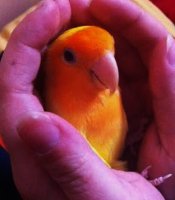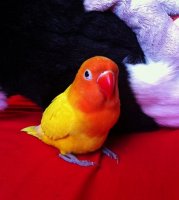Sunstorm
Meeting neighbors
I apologize if I'm posting this in the wrong section, I wasn't sure if it belonged here or in the Lovebird subforum. Also, I do want to warn readers that this story does not have a happy ending. After losing two lovebirds to seizures, I need to find out if this is a common occurrence, something we are doing wrong, or extremely, extremely bad luck.
My partner and I have owned birds for quite some time now, and about two years ago decided to add a young lutino Fischer's lovebird to our flock. We'd researched the species at great length, took the time to contact breeders and eventually brought home a six month old female named Lemon. Lemon was an extremely outgoing little bird and became very affectionate and very attached right away. She never displayed any unusual behavior or signs of illness, and fit right in. There was absolutely no warning before the morning we uncovered her cage and found her at the bottom acting listless and confused. We rushed her to our emergency avian vet, but it was too late. She'd seized the way there, and passed in the waiting room. I was absolutely devastated that there was nothing we could do, and the vet suggested that she may have started seizing during the night, and we'd just caught the end of it. He asked us about our bird room, her diet etc... everything checked out, and we could only chalk it up as a freak occurrence.
It took a long time to move past this, and it wasn't until six months later that I'd even considered another lovebird. A friend offered us Roddi, a three year old lutino hybrid - part peachface, part Fischer's. I had Roddi for well over a year with no issue, he was a plump, happy, and very vocal little bird. And then last week, I went to take him out for cuddles, and it was the horror with Lemon all over again. This time there wasn't even the opportunity to take him to the vet, he seized and passed within only a few minutes of me finding him.
I broke down, I love these little birds and I can't handle losing them one after another like this. We've checked our bird room time and time again, gone over our cleaning and feeding routines endlessly, looking for anything we might have done wrong that could have caused this. None of our other birds (four cockatiels, one ringneck parrot) have ever had seizures or illness. Both lovebirds were fed a seed blend, pellet, fresh fruit, and millet. There's no toxins in the room, nor have we ever used unsafe cleaning supplies on the cages/toys/etc. The bird room is kept at a consistent temperature, and isn't located near the kitchen or anything with dangerous fumes. I am at a loss as to what ended these little birds, and can't accept that it was just an 'accident' twice in a row. Any input would be greatly appreciated, I'd originally joined this forum to ask about this, and couldn't bring myself to write the topic until now. Thank you in advance.
My partner and I have owned birds for quite some time now, and about two years ago decided to add a young lutino Fischer's lovebird to our flock. We'd researched the species at great length, took the time to contact breeders and eventually brought home a six month old female named Lemon. Lemon was an extremely outgoing little bird and became very affectionate and very attached right away. She never displayed any unusual behavior or signs of illness, and fit right in. There was absolutely no warning before the morning we uncovered her cage and found her at the bottom acting listless and confused. We rushed her to our emergency avian vet, but it was too late. She'd seized the way there, and passed in the waiting room. I was absolutely devastated that there was nothing we could do, and the vet suggested that she may have started seizing during the night, and we'd just caught the end of it. He asked us about our bird room, her diet etc... everything checked out, and we could only chalk it up as a freak occurrence.
It took a long time to move past this, and it wasn't until six months later that I'd even considered another lovebird. A friend offered us Roddi, a three year old lutino hybrid - part peachface, part Fischer's. I had Roddi for well over a year with no issue, he was a plump, happy, and very vocal little bird. And then last week, I went to take him out for cuddles, and it was the horror with Lemon all over again. This time there wasn't even the opportunity to take him to the vet, he seized and passed within only a few minutes of me finding him.
I broke down, I love these little birds and I can't handle losing them one after another like this. We've checked our bird room time and time again, gone over our cleaning and feeding routines endlessly, looking for anything we might have done wrong that could have caused this. None of our other birds (four cockatiels, one ringneck parrot) have ever had seizures or illness. Both lovebirds were fed a seed blend, pellet, fresh fruit, and millet. There's no toxins in the room, nor have we ever used unsafe cleaning supplies on the cages/toys/etc. The bird room is kept at a consistent temperature, and isn't located near the kitchen or anything with dangerous fumes. I am at a loss as to what ended these little birds, and can't accept that it was just an 'accident' twice in a row. Any input would be greatly appreciated, I'd originally joined this forum to ask about this, and couldn't bring myself to write the topic until now. Thank you in advance.
Attachments
-
73.8 KB Views: 6
-
83.5 KB Views: 7




